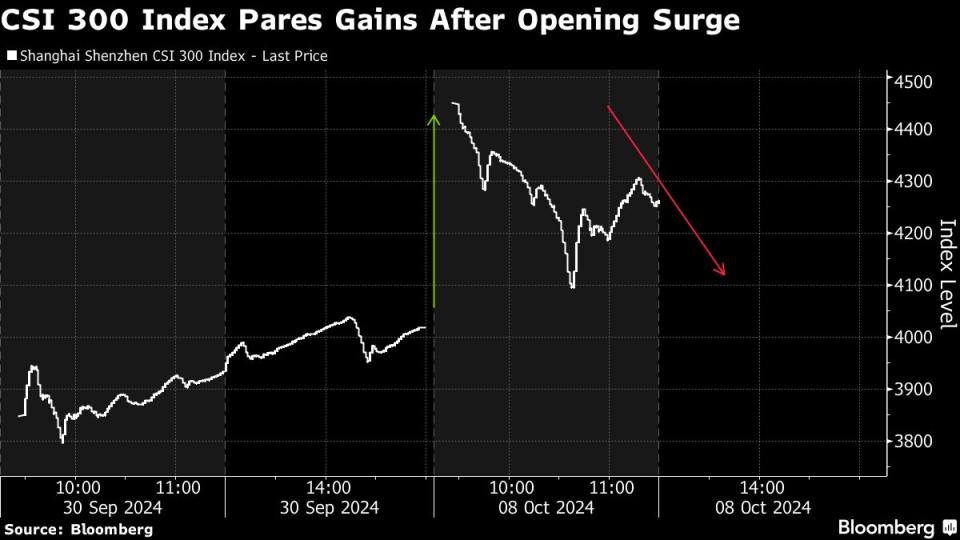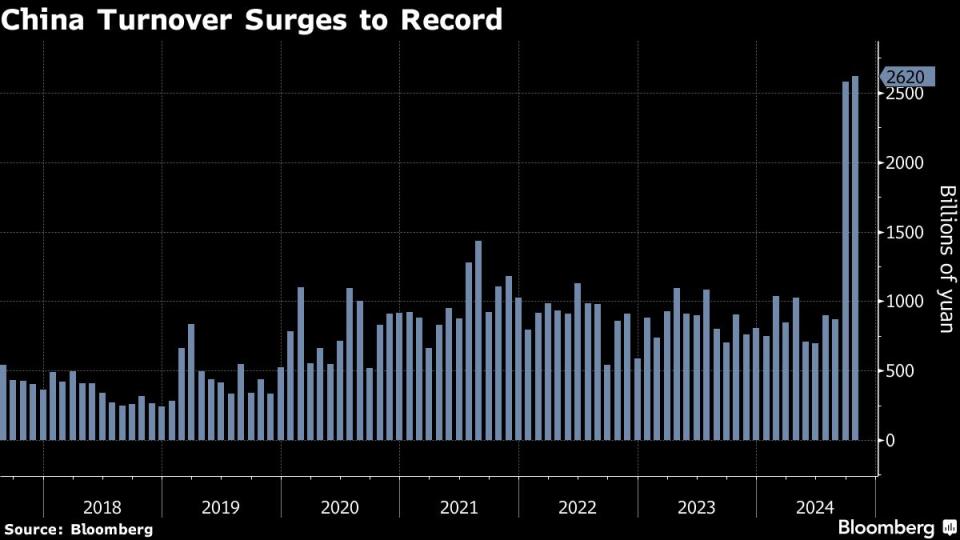China’s Stock Rally Cools as Beijing Holds Off on More Stimulus

(Bloomberg) — A rally in onshore Chinese stocks on their return from a week-long holiday cooled as traders questioned Beijing’s resolve to add more stimulus. Shares in Hong Kong tumbled.
Most Read from Bloomberg
The benchmark CSI 300 (000300.SS) Index was 5.1% higher in mid-day trading after surging almost 11% in the opening minutes. Equities pared gains after officials at China’s top economic planner — the National Development and Reform Commission — held back in unleashing any more major stimulus at a press briefing.
A gauge of Chinese shares listed in Hong Kong tumbled as much as 11% after having climbed by almost the same amount in the period that onshore markets were shut. The CSI 300 had risen for nine straight days through Sept. 30 before the Golden Week break, boosted by a stimulus blitz that included interest-rate cuts, freeing-up of cash for banks and support for stocks.
“The durability of this China rally will depend on action following words on the fiscal side of the equation,” said Aleksey Mironenko, global head of investment solutions at Leo Wealth in Hong Kong. “The key thing we are watching going forward — what policies will be announced in coming weeks following the Politburo and State Council statements? That will determine if our overweight is a tactical one — to be taken off as relative valuations change – or a strategic one.”

Even before mainland markets reopened, skepticism had been growing over the surge in Chinese shares. Many strategists and fund managers had viewed the recent rebound with wariness and said they were waiting for Beijing to back up its stimulus pledges with real money. Some had also become concerned many stocks were already at overvalued levels.
An overheating of the A-share market and the Chinese government’s delivery on its recently-announced policy stimulus are among the risks investors should watch amid the Chinese stock market rally, Morgan Stanley strategists including Laura Wang in Hong Kong wrote in a research note.
Turnover in Shanghai and Shenzhen surged to a record 2.6 trillion yuan ($368 billion) in Tuesday’s session. That surpassed the level seen on Sept. 30, when the CSI 300 Index climbed 8.5%, the biggest one-day surge since 2008.
Several brokerages saw their trading apps experience temporary freezes amid surge in trading volumes, Cailian reported, citing an IT professional at a brokerage firm.
Anticipation had been building up as Chinese stocks in Hong Kong rallying when onshore markets were shut. Professionals in the information technology, operations and customer service departments at local brokerages canceled their holidays to prepare for a busy trading session, according to state broadcaster China Central Television. The number of account openings at major brokerages hit a record high during the Golden Week break, with overwhelming client demand in both online and offline channels.
The Hang Seng China Enterprises (^HSCE) Index, which comprises Chinese stocks trading in Hong Kong, plunged as focus shifted to onshore markets. It had jumped more than 30% over the past month through Monday, making it the best performer among more than 90 global equity gauges tracked by Bloomberg.
“There is some convergence in the markets — a rotation from Hong Kong to China,” said Marvin Chen, a strategist at Bloomberg Intelligence in Hong Kong. “A-shares are primarily going to be the beneficiary of the domestic liquidity stimulus.”
Greater spending
Officials at NDRC said they would speed up spending, while largely reiterating plans to boost investment and increase direct support for low-income groups and new graduates. They added that China would continue to issue ultra-long sovereign bonds next year to support major projects and bring forward a 100 billion yuan investment on key strategic areas originally budgeted for 2025 to this year.
China’s offshore yuan briefly flipped to losses during the policy briefing as the stock rally lost steam before stabilizing. The onshore exchange rate, which had stayed shut for five sessions, posted a catch-up move declining 0.6% to 7.066 per dollar. Yields on the nation’s benchmark bond initially rose seven basis points before paring that move to 2.18%.

China’s leaders aim to achieve around 5% growth this year, but economic data in recent months show that would be hard to reach as consumer spending remained sluggish and a property downturn persisted.
The world’s second-largest equity market has had multiple boom-and-bust cycles. Confronted by slowing growth and disinflation, China swung into stimulus mode in late 2014, setting off an eye-watering stock market rally that spectacularly crashed back to earth in mid 2015. The Shanghai Stock Exchange Composite Index more than doubled its level from October 2014 to June 2015, but then plunged more than 40% in two months.
“We need fiscal, and then hopefully some real major economic reform,” Eva Lee, head of Greater China equities at UBS Global Wealth Management in Hong Kong, said on Bloomberg Television. “By the end of this year, if we still do not have any major measure, we probably will end at this level.”
—With assistance from Tian Chen, John Cheng, Sangmi Cha and April Ma.
Most Read from Bloomberg Businessweek
©2024 Bloomberg L.P.








